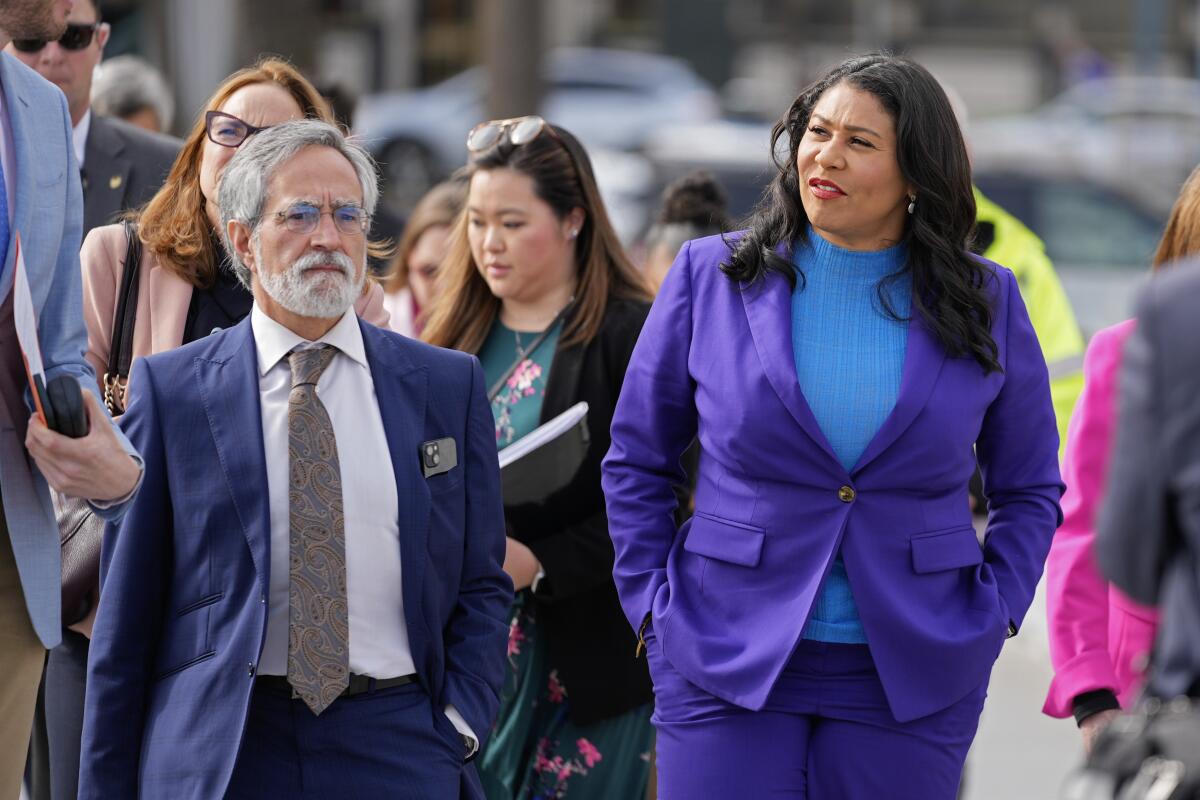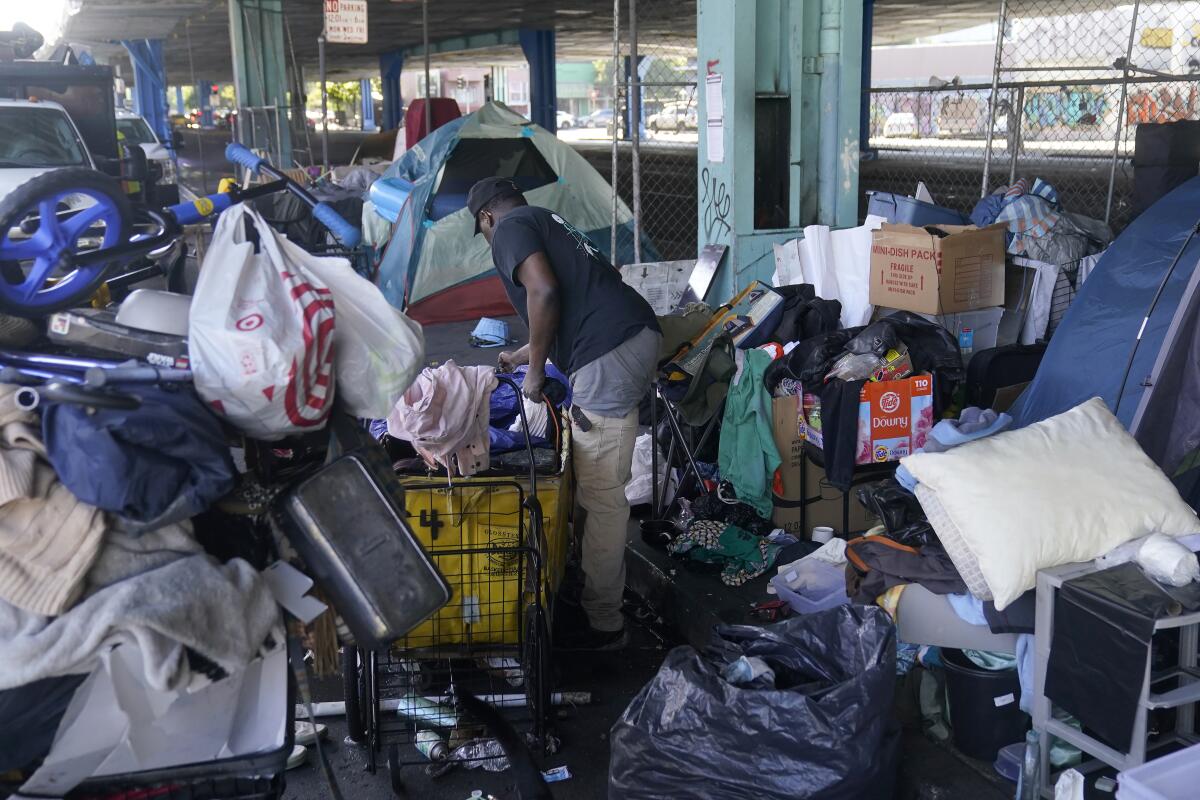San Francisco has shifted to the center. Can a progressive still compete there?

- Share via
Good morning. Here’s what we’re covering today:
- Has famously liberal San Francisco moved too far right to embrace an old-school progressive for mayor?
- The impact of the Fed’s interest rate cuts could be greater in California than elsewhere.
- Here are 11 beachside dining destinations that are worth your time.
- And here’s today’s e-newspaper
Sign up for Essential California
The most important California stories and recommendations in your inbox every morning.
You may occasionally receive promotional content from the Los Angeles Times.
In San Francisco, the race against progressive politics
There are 46 days left until the general election, and in California outrage over the progressive agenda is playing out in an unlikely place: The San Francisco mayoral race.
My colleague Hannah Wiley looked into the race this week and found that only one of the race’s five candidates, San Francisco Board of Supervisors president Aaron Peskin, is running on a progressive agenda. And he’s the underdog.
What does it all mean? Is San Francisco no longer a bastion of progressive politics? What even is progressivism?
Famous for being a pioneer of progressive political discourse, San Francisco has in recent years tottered toward the center.
In March 2024, voters approved ballot measures to broaden police surveillance powers and impose drug screening and treatment mandates for people receiving county welfare benefits who are suspected of illicit drug use.
San Francisco Mayor London Breed championed both measures. That same evening, a group of moderates took control of the governing body of the local Democratic Party.
San Francisco’s slow recovery from the COVID-19 pandemic has upended the city’s culture and shaken voters’ trust in the city’s leadership.

In February 2022, voters recalled three school board members after parents expressed frustration that while the city closed its schools for more than a year — longer than most in the nation — the school board persisted to engage in an effort to rename a third of the city’s public schools whose existing names, critics claimed, celebrated historical figures associated with slavery or oppression of women or “who otherwise significantly diminished the opportunities of those amongst us to the right to life, liberty, and the pursuit of happiness.”
Four months later, voters also recalled then-Dist. Atty. Chesa Boudin, a leading reform advocate criticized by opponents over progressive policies on sentencing and incarceration.
San Francisco’s ascendent tech class has led the rightward shift.
In recent decades, it hasn’t been unusual for San Francisco to elect mayors who are centrist Democrats alongside a more progressive Board of Supervisors.
Tech executives and wealthy business owners are pouring money into the campaigns of moderate candidates — including the current candidates, apart from Peskin.
And a growing number of voters, including those tech titans, want to see more punitive measures against the sprawling tent encampments and the outpouring of retail and property crimes that have diminished their understanding of a safe, functional city.
What does progressive even mean?
Peskin says he joined the race to keep San Francisco a “beacon” for the artists, creatives, immigrants and LGBTQ+ leaders who have defined the city for decades, and to fight for working-class people to reposition San Francisco as an affordable city.
He’s promised to prioritize low-income housing and expand rent control, and says he wants to open more treatment facilities and expand shelter capacity for homeless people. But he also touts “neighborhood preservation” and has resisted attempts to amend zoning rules for certain neighborhoods to allow for denser housing.
And so, for some, Peskin, who opposes the idea that development is key to bringing costs down, claims the “progressive” mantle when it comes to housing. But for others, Peskin’s perspective reflects an impractical, even conservative, approach to the city’s housing crisis.
Whether Peskin is a textbook progressive is up to interpretation — including his own. He told The Times he’s willing to defy the label and supports a controversial November ballot measure that would reverse a 2014 voter-approved law that turned some nonviolent drug and theft felonies into misdemeanors.
It just goes to show you: Few candidates fit under a neat box, even if they try to claim or eschew one. It’s the policies, not the label, that will define the next few years of San Francisco’s political landscape.
Today’s top stories

The Fed cut interest rates — and the impacts may be greater in California than in many other states
- The Federal Reserve, hoping to give a strong adrenaline shot to the economy, announced a big, half-point reduction in interest rates.
- California’s economy is highly sensitive to interest rates, especially in its housing and small businesses.
- The cut in interest rates comes as mortgage rates are falling. “I think for the next two years, we are in a world where the pressure is on rates to come down,” said the chief economist of real estate brokerage Redfin.
A wall of secrets may crumble as feds call out enablers of Sean “Diddy” Combs’ alleged sex crimes
- Combs was the only defendant indicted this week in a sweeping sex trafficking and racketeering investigation. But federal prosecutors have made clear that they do not believe he was the only one responsible.
- Meanwhile, Aubrey O’Day, a former singer for Danity Kane, said she feels validation and vindication after Combs’ arrest.
An L.A. couple is accused of wielding an AK-47 in a brazen string of dispensary heists
- A young couple targeted four cannabis dispensaries for robberies during a six-week-long spree, prosecutors say. Detectives titled the case file “Romeo and Juliet.”
- Testimony and video of the takeover-style heists offered a startling example of the violence that shadows California’s booming cannabis black market.
A California zoo, an advancing wildfire and a delicate rescue operation
- The Big Bear Alpine Zoo, which houses rehabilitated animals that are unable to be released into the wild, launched an evacuation as it came under threat from the Line fire.
- “I had two foxes in the back of my personal car,” said zoo curator Jessica Whiton. “It’s not ever going to smell the same.”
More big stories
- Trump said he would uncap the state and local tax deduction, a California favorite.
- The trial of a reputed Mexican cartel leader’s son offers a cautionary tale for “narco juniors.”
- California’s film industry is in crisis. Can it be saved?
- YouTuber MrBeast and Amazon were sued by contestants on the upcoming “Beast Games” who said they faced a “hostile work environment.”
- A river dried up abruptly in Bakersfield, leaving thousands of dead fish.
- A brain-infecting parasite was found in two L.A. County residents, but the the risk to the general public is low.
Get unlimited access to the Los Angeles Times. Subscribe here.
Commentary and opinions
- Enough with the lube jokes. The charges against Sean “Diddy” Combs are no laughing matter, columnist Mary McNamara writes.
- This bellwether county picked the presidential winner 11 straight times. Here’s how it views Trump vs. Harris, columnist Mark Z. Barabak writes.
- Trump and his family have jumped into crypto, which the FBI calls a hive of “pervasive” criminality, columnist Michael Hiltzik writes.
- Nobody’s ever talked the way Trump does. It’s like no one before. Or so it seems, writes Laurie Winer, a founding editor of the Los Angeles Review of Books.
- California’s AI safety bill is under fire. Making it law is the best way to improve it, writes Herbert Lin, a senior research scholar at the Center for International Security and Cooperation at Stanford University.
Today’s great reads
Motivation is a mystery in apparent Israeli attack on Lebanese militia’s communications network. The deadly sabotage of pagers used by the militant group Hezbollah is widely blamed on Israel — but what was attack’s real aim?
Other great reads
- How could pagers in Lebanon have been rigged to explode?
- A Taiwanese company denied responsibility for making and distributing a batch of exploding pagers that killed at least nine people and wounded thousands more.
How can we make this newsletter more useful? Send comments to [email protected].
For your downtime
Going out
- 👻 The new Elvira “XXPerience” celebrates 40 years of sexy, spooky, hilarious nights at Knott’s Scary Farm.
- 🌊 Here are 11 beachside dining destinations that are worth your time.
- 🚄 Check out the “party car” that might be available on the high speed rail being built between SoCal and Las Vegas.
- 🎰 Speaking of which, here’s how to conquer the new Las Vegas.
Staying in
- 💀 A decade later, “The Babadook” is still with us and stronger than ever in memes.
- 🔎 Looking for a good mystery to read this fall? Here are five recommendations, including an engaging Hanukkah anthology that scrambles the holiday’s traditions into eight so-bad-they’re-good nights.
- 😞 Tortured by regret? Here’s a trick to make peace with the past.
- 🥗 Here’s a recipe for butter pecan banana muffins.
- ✏️ Get our free daily crossword puzzle, sudoku, word search and arcade games.
And finally ... from our archives
Martin Scorsese’s “Goodfellas,” which raised the bar on gangster films, was released in the U.S. on Sept. 19, 1990.
“To see an artist working at the peak of his power, everything extraneous stripped away, every element there for a purpose, is an extraordinary exhilaration,” Times critic Sheila Benson wrote of Scorsese in her review.
Have a great day, from the Essential California team
Ryan Fonseca, reporter
Defne Karabatur, fellow
Andrew Campa, Sunday reporter
Hunter Clauss, multiplatform editor
Christian Orozco, assistant editor
Stephanie Chavez, deputy metro editor
Karim Doumar, head of newsletters
Check our top stories, topics and the latest articles on latimes.com.
Sign up for Essential California
The most important California stories and recommendations in your inbox every morning.
You may occasionally receive promotional content from the Los Angeles Times.





